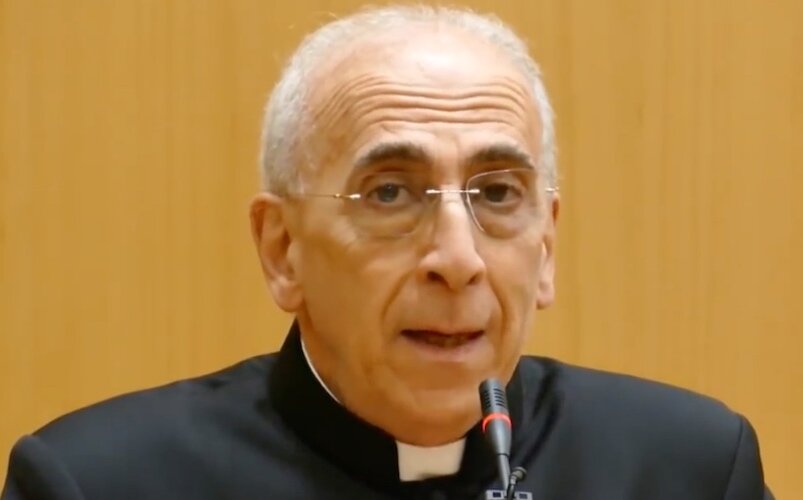VATICAN CITY (LifeSiteNews) — The prominent Vatican theologian Monsignor Nicola Bux has rejected a recent defense of Fiducia Supplicans made by the Vatican’s official news portal, saying there is no such thing as a non-liturgical blessing.
“There is no such thing as a blessing that is not liturgical, when it is made by an ordained minister, who exercises the munus sanctificandi with and in the sacred liturgy, on behalf of the Church,” wrote Msgr. Bux.
The monsignor’s commentary – published first in Italian and subsequently in the National Catholic Register – came as a response to an article published by Vatican News’ editorial director Andrea Tornielli, claiming that the “blessing” of homosexual “couples” as outlined in the declaration Fiducia Supplicans was rooted in the “important precedent” between liturgical and non-liturgical found in the Congregation for the Doctrine of the Faith’s (CDF) 2000 document “Instruction on Prayers for Healing.”
READ: Theologians reject Vatican News’ use of Ratzinger, John Paul II to defend Fiducia Supplicans
As LifeSite has reported, Tornielli’s argument was based on the CDF text’s treatment of “non-liturgical” prayers, which he equated with the proposed so-called “non-liturgical” “blessings” of homosexuals in Fiducia Supplicans.
As Bux noted, Tornielli aimed to “assert that distinguishing between rituals inserted into liturgical books and pastoral or spontaneous prayers is the same criterion now being used to admit the possibility of blessing irregular couples.”
The comparison between the two documents is “completely wrong,” wrote the theologian, who is a former consulter to the CDF. “Firstly, it’s important to point out that prayer is an insistent request, as the word itself indicates, while a blessing is a formula of approval (bene dicere) from above, that is, from God.”
The CDF’s 2000 text, titled in Latin Ardens Felicitatis, was, said Bux, to “help regulate the growing novelty of prayer gatherings given that they are combined with liturgical celebrations aimed at imploring healing from God, underlining the liturgical aspect over which the Church must watch and give norms, so that such practices may be disciplined righteously.”
Ardens Felicitatis makes brief mention of certain “non-liturgical” prayers of healing, which he noted “are not blessings, and they have no efficacy as blessings, especially if the faithful do not want to leave the state of sin.”
Indeed, Ardens Felicitatis’ focus is on prayers of healing, with Msgr. Bux writing that it contains just “a single reference to ‘the blessings of good health.’”
READ: Leading Vatican theologian says Fiducia Supplicans is not part of the ‘authentic Magisterium’
“The Vatican News article, then,” he attested, “incurs a glaring oversight by calling Ratzinger into question.”
Defense of Fiducia Supplicans has focused heavily on the issue of so-called “non-liturgical” blessings, while notable critics such as Cardinal Robert Sarah have protested strongly against such arguments. Adding to Cardinal Sarah’s argument, Bux recalled that something liturgical is “the public worship of the Church, the people of God gathered in the Name of the Trinity,” while the “‘non-liturgical,’… are exercises of piety that the individual believer does alone or with others.”
Given that a blessing is “a sacramental, that is, an extension of the grace of the sacrament, which in order to be received requires a good disposition to receive the principal effect of the sacrament to which it is ordained,” the theologian noted that a blessing cannot be called down upon a state of sin:
A blessing is not compatible with a state of sin: One cannot bless that which breaks, consumes, destroys. To which sacrament, therefore, is the blessing of an irregular couple ordered? It is not true that blessing promotes and justifies nothing, because it implicitly promotes “disordered acts” and a pseudo union.
In the text of Fiducia Supplicans, the expression ‘blessings of same-sex couples’ recurs explicitly seven times. But when it comes to people of the same sex, there is no such thing as a couple. They are similar, and being similar, they make a pair but not a couple.
Concluding his rebuttal of Tornielli’s piece, Bux wrote succinctly: “So, there is no such thing as a blessing that is not liturgical, when it is made by an ordained minister, who exercises the munus sanctificandi with and in the sacred liturgy, on behalf of the Church.”
Tornielli’s article “is deceptive and constitutes a shameless falsification, perhaps with the intention of pleasing the court,” he closed.
The theologian has previously stated that Fiducia Supplicans “does not belong to the ‘authentic Magisterium’ and is therefore not binding because what is affirmed in it is not contained in the written or transmitted word of God.”
Nor is he alone in his firm destruction of Tornielli’s argument. Speaking to LifeSiteNews last week, a Dominican theologian wrote about the Vatican News’ article that, “as it stands, it is obviously a fallacy; you might as well argue that therefore there can be non-liturgical altars.”
“One difference between a prayer and a blessing is that a blessing is always in some way an act of authority, and so in that sense is always done in the name of Christ the Leitourgos/Minister of the sanctuary (Heb. 8:2). So in that sense all blessings are liturgical,” he wrote.

